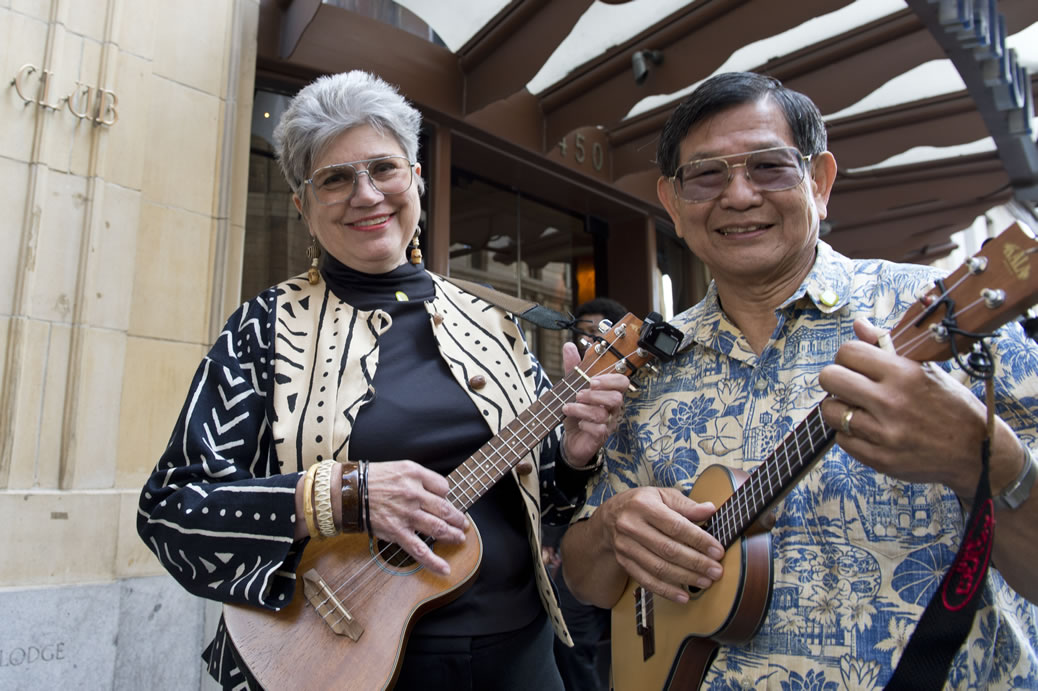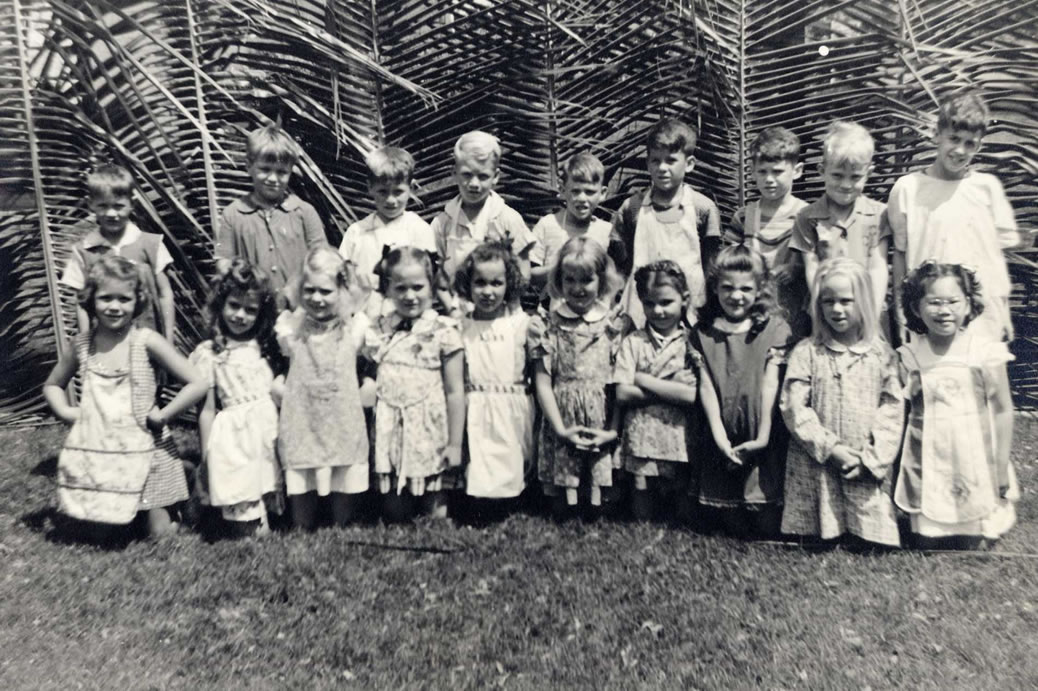You are at: Planned Giving > Looking Forward

In harmony: An alumni duo 'plays' it forward

By notifying Punahou that the School was included in their estate plans, Steve and Judy started a conversation about their interests for their planned gifts and became eligible for membership in Ka Punahou Society.
Brought together over a shared passion for the arts, a couple gives back to the place where it all started.
Judy Winn-Bell '62 was the new girl from Hanahau‘oli School when she first met Steve Hayashi '62 in seventh grade at Punahou. Steve was into theater, drama and photography. He spent four years working with the lighting crew on Dillingham Theater productions, while Judy was interested in music. A shared interest in the arts struck a chord and sparked a friendship.
Steve and Judy went their separate ways – one moved to the East Coast, the other to the West – but it was their connection through Punahou that reunited them and inspired a gift back to the place they first met.
Steve continued his love affair with theater as the drama shop photographer at MIT in Boston. At San Jose State University, Judy majored in speech and drama, and briefly studied in Japan. She graduated with a bachelor's degree in linguistics and English language studies. At UCLA, she earned a master's and taught English as a second language, and Steve, after graduating from college, went to Northeastern University to earn his master's degree.
Steve and Judy remained friends, and when Steve moved to Sunnyvale, California, to work in the tech industry, he and Judy found themselves in the same state. A romance blossomed, and in 2000, they married.
Giving back
Like many Punahou alumni, Steve and Judy had estate plans that included a gift for Punahou, but they had not informed anyone at Punahou about the desired direction for their gifts. Out of his appreciation for Punahou's performing arts programs, Steve's desire was to support English and drama. Judy wanted to honor stepfather Donald W. Bell, a faculty member at the University of Hawai‘i – Manoa, through financial aid for students with parents who work in public education.
Fortunately, when Steve and Judy made a gift to Punahou's Annual Fund in 2014, they checked the box on the gift form notifying Punahou that the School was included in their estate plans. By doing so, they began a conversation with the gift planning staff around their interests for their planned gifts and became eligible for membership in Ka Punahou Society, Punahou's legacy club.
Steve and Judy's bequest intentions took shape in the form of the Steve Hayashi '62 Endowed Fund and the Donald W. Bell Endowed Financial Aid Fund. The alumni then decided to establish the funds during their lifetime with a five-year pledge, directing their bequests to eventually flow into their respective funds.
When Steve turned 70 1/2 years old and it was time to take his first required minimum distribution (RMD) from his individual retirement plan (IRA), he elected to defer the distribution until the following year. He soon found himself facing a larger tax liability as a result of combining the RMDs for the first two years.
Rather than pay tax on the double RMDs, Steve and Judy decided to make a gift to Punahou, becoming eligible to claim a charitable deduction that reduced their taxes while also fulfilling their pledges.
The band plays on
Today, Steve and Judy are active members of Na Hoaloha, a troop of 20 ukulele players that promotes Hawaiian music in the Bay Area. Na Hoaloha regularly perform every first Friday at Kawika's Ocean Beach Deli, owned by David Nottage III '86, in San Francisco.
Steve and Judy are eternally grateful for the opportunities and experiences at Punahou made possible by the gifts of those that came before them. Recognizing their good fortune, they are paying the gift forward today and tomorrow.
The Manoa Moment

Jackson's 1944 class somewhere in Manoa that had fresh-cut palm fronds since there were no school steps. Where's the teacher? She was taking the picture.
by Gregory Jackson '56
There were a little over 100 of us first-graders when we came to Punahou in 1944. Actually, we never really arrived. The Army still occupied the place. From the road, all we saw were Italian POWs in striped pajamas pruning the night-blooming cereus.
That first year, classes were held in Manoa neighbors' homes. In second grade, we moved to temporary bungalows on the lower field, and a new, multicultural Punahou slowly emerged after the war. We came from all over: from Kahala and Makiki, from Lihue and Kula and Hilo, from Nu‘uanu and Kailua, from Waipahu and Waimanalo and Makalapa, and one classmate who surely escaped from Kan‘eohe.
By the fourth grade I was a disaster – a redhead in the land of Hawaiians, always in trouble, virtually illiterate – until the incomparable Mabel Hefty fished me out of pilikia corner and taught me to read, way beyond my grade level, in nine months.
She saved many of us, but it was in shop class where Jack Stubbart taught lifetime lessons. If put to a vote, we Punahou boys of that era would beatify him.
Before television reached the Territory of Hawai‘i, Punahou was our "Gilligan's Island." That's where all our "firsts" happened together: the first time we had to wear shoes to school (sixth grade), our first teams, our first crushes, our first dates (18 in the class married each other) and our first college choices. John Fox, the 14th president, made sure that happened. Even in middle school, he'd herd us into Dillingham to show slides he took of Punahou graduates standing knee-deep in snow on mainland campuses to make sure we got the message. Most of us had never even seen snow, and college was not on our minds. We lived in the Manoa moment.
We knew the nooks and crannies of every hall emblazoned with the names of the missionary families who came before us: Rice, Dole, Castle, Bingham, Cooke, Bishop, Wilcox and Alexander – grand old wooden buildings locked in a losing race with the termites. We knew the smell of the wooden floors and stone walls of the indestructible Pauahi Hall where we went for Bible study (mandatory) and chemistry classes to memorize elements not yet discovered when it was built.
Nobody went home after "school." That's when the place came alive. We went to Dillingham for theater and dance, or to the music building or to ROTC or to the shop for hot rods, or to the pool and the courts and the track and the fields and the ancient locker room overseen by the unflappable Mr. Okamoto.
I suppose our campus was a rather modest affair compared to today's sleek, ever-changing grounds adorned with new generations of names on the walls. Doesn't matter. Isolated on a volcanic speck in the middle of the Pacific Ocean, we were the buff and blue threads woven into those indelible formative years. More than a campus, more than a school – in the truest sense of the Hawaiian word, for many of us, the memory of Punahou is the memory of ‘ohana. Family.
After Punahou, Jackson went to Columbia University, transferred as a junior to Whitman College and returned to Columbia University Graduate School of Journalism before becoming a network television correspondent, producer and late-night host. The father of five now lives in Los Angeles and remains an active independent producer.
IRA Report Card
For many, the greatest asset – apart possibly from one's home – is an IRA or other retirement plan. But as the assets in an IRA grow, so do the taxes that will be owed in the future. In fact, each year after reaching 70 1/2, you are required to take certain minimum distributions from your IRA and report them as income on your individual tax returns.
The increased income may push you into a higher tax bracket and trigger a greater tax obligation. Similarly, when your children or grandchildren receive the assets in your IRA, they also assume the burden of the taxes due.
The good news is there are ways to plan for your IRA to deliver all its expected benefits with as few taxes as possible. When you designate a qualified tax-exempt organization like Punahou as a beneficiary of your IRA, the impact of your gift is not reduced by taxes. Upon your passing, IRA assets can also be used to fund a charitable remainder trust that provides income to your heirs and benefits Punahou too.
In the spirit of storytelling
By Carrie Ogami, Director of Gift Planning
Storytelling. We do it every day. Around the dinner table. Across the fence with our neighbor. Through social media. The stories we share about Punahou are what keep us connected as a community.
I have my own Punahou story. Although I graduated from University Lab School, my mother sent me to summer school in the Winne units from kindergarten through fourth grade. It was 1964, between kindergarten and first grade, when I had to present my first book report.
I was nervous about speaking in front of kids I had just met. I worked hard on my report, reading "Green Eggs and Ham" by Dr. Seuss over and over. When it was my turn to present, I stood in front of the other kids who sat barefoot around me. With butterflies in my stomach and without making any eye contact, I recited the entire book, word for word, from memory. I guess I didn't understand what a book report was exactly, but I earned my first "A for effort."
I learned that day that my effort was something to be counted too. If I worked hard, even if the final product wasn't perfect, at least I learned something. The process could be just as fulfilling as the outcome. It is the journey, not the destination, where we find value and meaning.
We invite you to tell us your story. Share with us if you have included Punahou in your estate plan or if you would like to learn more about doing so. Tell us what Punahou means to you. What life lessons did you learn on your journey at Punahou and after?
Did you know?
- » Providing information about your interests allows the School to work with you and clarify the specific purpose of your gift. This ensures that the School can implement your philanthropic intentions as well as thank you and celebrate your participation in the mission of Punahou School.
- » You can see the benefits of your gift within your lifetime. Establish a fund to contribute to now and direct your bequests to supplement it later.
- » If you designate Punahou as the beneficiary of your IRA, 401(k), 403(b) or other qualified plan, your planned gift can be counted towards your reunion class gift.
- » If you decide to make a gift from your IRA, you should contact your plan administrator to arrange a direct transfer to Punahou in case charitable rollover legislation is revived retroactive for 2015.
- » Although Punahou's gift planning staff cannot give tax advice, they can offer ideas for how gifts can be used.
 By notifying Punahou that the School was included in their estate plans, Steve and Judy started a conversation about their interests for their planned gifts and became eligible for membership in Ka Punahou Society.
By notifying Punahou that the School was included in their estate plans, Steve and Judy started a conversation about their interests for their planned gifts and became eligible for membership in Ka Punahou Society.



 Jackson's 1944 class somewhere in Manoa that had fresh-cut palm fronds since there were no school steps. Where's the teacher? She was taking the picture.
Jackson's 1944 class somewhere in Manoa that had fresh-cut palm fronds since there were no school steps. Where's the teacher? She was taking the picture.